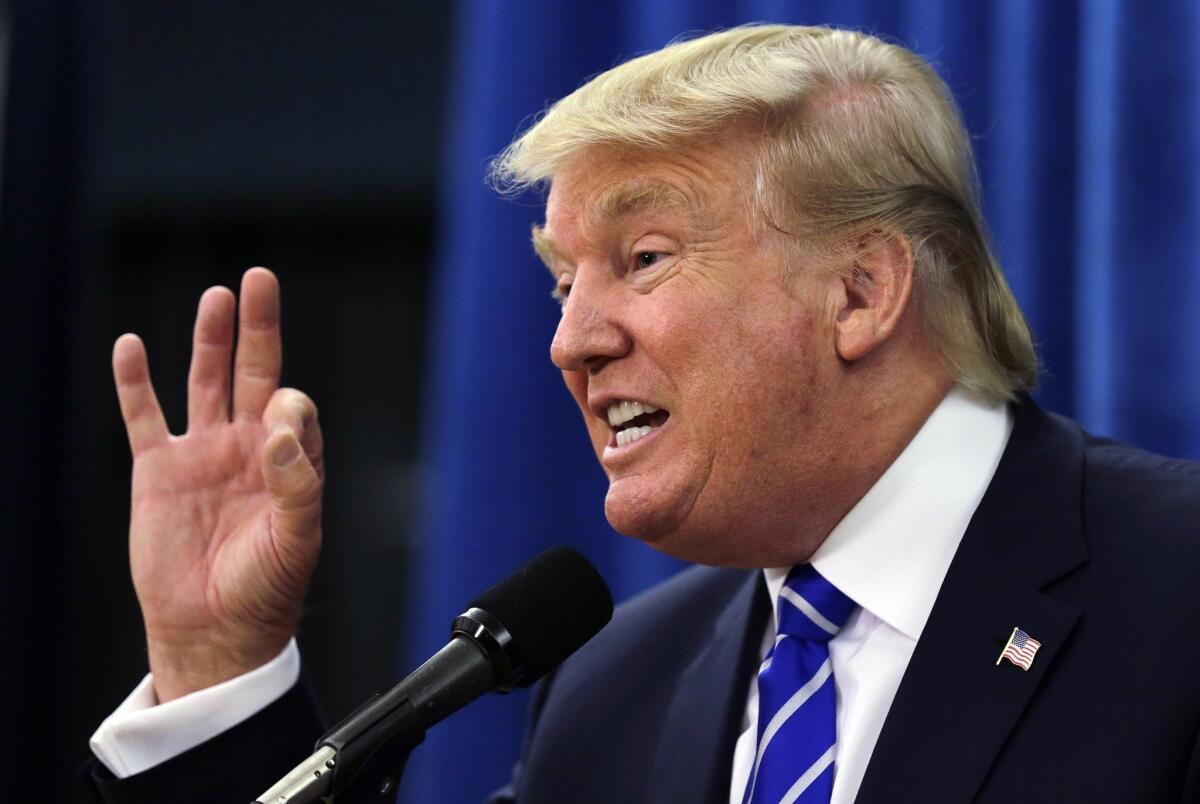Editorial: With campaign costs about to skyrocket, Donald Trump suddenly loses his aversion to fundraising

Republican presidential candidate Donald Trump gestures during an event in Hampton, N.H. in August of 2015.
For a year, Donald Trump has piously insisted that he couldn’t be bought or sold because he was a rich man, dependent on no one and beholden to no one. To prove it, he covered most of the cost of his campaign for the Republican presidential nomination out of his own deep pockets and didn’t actively raise money from donors.
Jeb Bush, he said, was a “puppet” to his contributors and would do “whatever they want.” He, Trump, didn’t have to worry about that. In fact, when a lobbyist called him, offering $5 million to support his candidacy, he claims to have responded: “I don’t want it. Because when you come back to me in two years and you want help for a company that you’re representing, or a country that you’re representing, I’m going to do the right thing for the people of the United States.” If he took the money, he said “I’d feel obligated, because I’m a loyal person.”
Except, uh, not anymore. This week, Trump announced to the Wall Street Journal that he was changing course and would begin actively raising money for the general election to ensure that he has what he needs to compete with the expected Democratic Party nominee, former Secretary of State Hillary Clinton. No longer will his campaign rely on loans from Trump himself (and a “Donate Now” button on its website, which had helped raise about $12 million). Instead, he is putting together a fundraising team to go after the big dollars.
Hypocrite alert! Flip-flop alarm! What happened to independence? Is there any other way to greet this news than to assume that Trump will now feel “obligated” to those who give and that he too will be a “puppet,” loyal to his donors and their needs?
In semi-defense of Trump, it’s awfully expensive to pay for a presidential run. Clinton has already raised more than $213 million for her campaign through the end of April, on top of $67 million raised by her allied super PACs, according to the Journal. Before the race is over she could raise and spend as much as $1 billion, and Trump is under pressure to do the same if he is to remain competitive.
He could power his campaign with public financing, which would eliminate the potentially corrupting effects of private fundraising. But even a candidate who attracts as much free media coverage as Trump would be hard-pressed to compete effectively with only $96 million to spend in the general election, which is public financing’s spending cap.
While there are no doubt many Americans who will donate $10 and $25 and $100 to Trump, there also thousands of business officials, corporations, unions and other interests that will want to help the campaign one way or another — for example, by encouraging their employees to give a few thousand dollars each to the candidate or by spending unlimited sums on independent campaigns. It’s an enormous amount of money, and, as Trump himself has pointed out, lobbyists don’t spend money on candidates “because they like the color of [your] hair.”
It’s an unseemly system, to say the least, and Trump was right to recognize that voters don’t believe in it. He saw that ordinary people feel they are being ignored in favor of special interests that can afford to buy access and influence, and he knew he could win votes by claiming to be unbuyable.
But now that the cost is rising, he doesn’t want to put his money where his mouth is and spend $1 billion of his own money on November’s election. In retrospect, perhaps he believes that being bought and sold is not as bad as it first appeared. Welcome to the game, Mr. Trump.
Follow the Opinion section on Twitter @latimesopinion and Facebook.
MORE EDITORIALS
It’s officially doomsday for the GOP establishment
Gov. Scott, try to create jobs in Florida instead of stealing them from California
More to Read
A cure for the common opinion
Get thought-provoking perspectives with our weekly newsletter.
You may occasionally receive promotional content from the Los Angeles Times.






